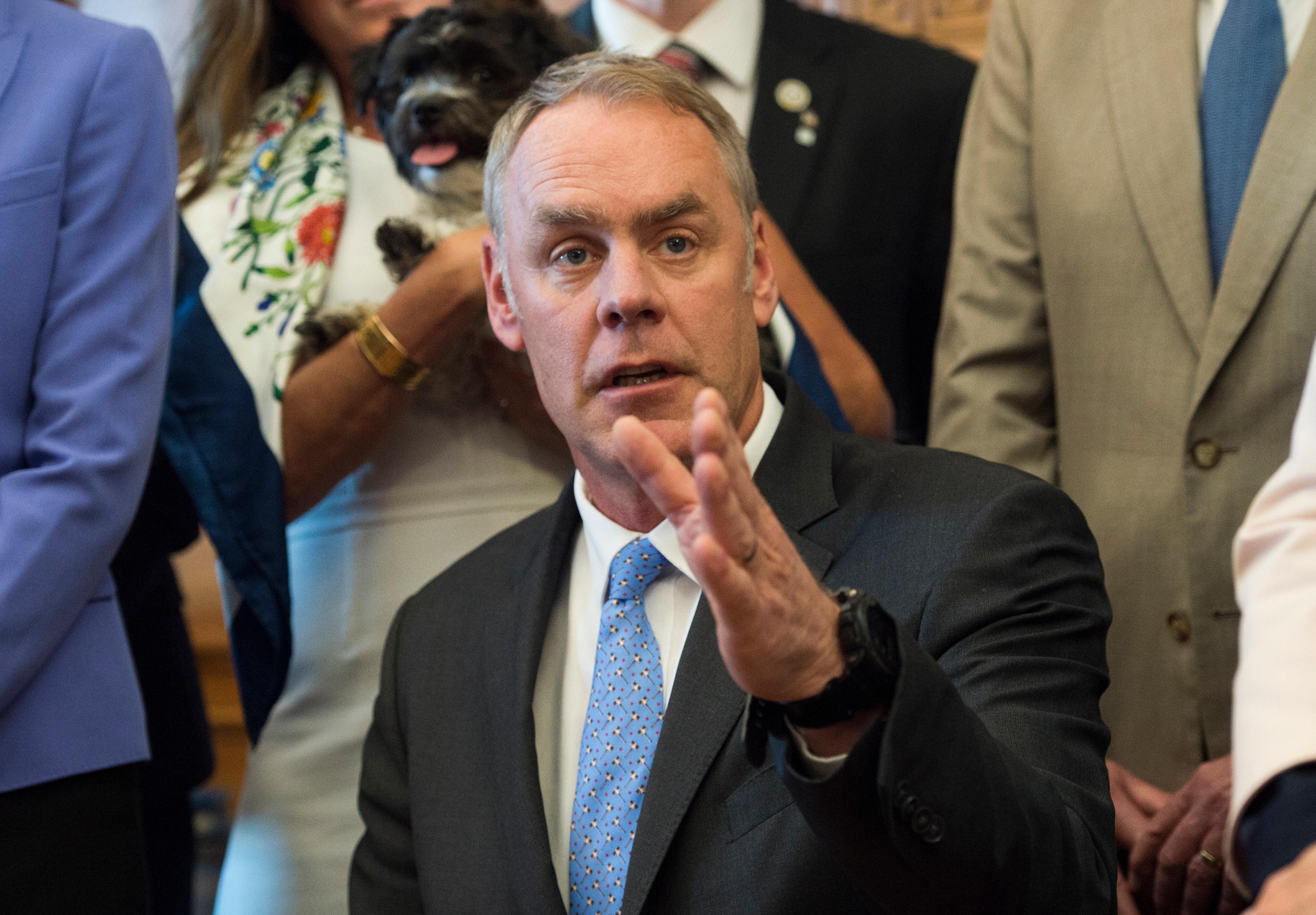

Published 8:16 a.m. | Updated 4:39 p.m.
Interior Secretary Ryan Zinke, who is facing federal investigations into his travel, political activity and potential conflicts of interest, will leave the administration at year’s end, President Donald Trump said Saturday.
Trump, in tweeting Zinke’s departure, said the former Montana congressman “accomplished much during his tenure” and that a replacement would be announced next week. The Cabinet post requires Senate confirmation.
Secretary of the Interior @RyanZinke will be leaving the Administration at the end of the year after having served for a period of almost two years. Ryan has accomplished much during his tenure and I want to thank him for his service to our Nation.......
Zinke is leaving weeks before Democrats take control of the House, a shift in power that promises to sharpen the probes into his conduct. His departure comes amid a staff shake-up as Trump heads into his third year in office facing increased legal exposure due to intensifying investigations into his campaign, business, foundation and administration.
- What You Need To Know About Zinke’s No. 2: Meet Colorado Native David Bernhardt
Zinke, 57, played a leading part in Trump’s efforts to roll back environmental regulations and promote domestic energy development. When he recently traveled to survey damage from California’s wildfires, Zinke echoed Trump’s claims that lax forest management was to blame in the devastation. Fire scientists, however, say forest management was not a leading contributor.
He pushed to develop oil, natural gas and coal beneath public lands in line with the administration’s business-friendly aims. That includes on Western land that is home to the sage grouse, and Zinke's departure comes just after the Interior Department announced new plans to weaken protections for the threatened bird across several states. As the 30-day comment period unfolds over the next several weeks, Colorado government officials are looking to fine-tune the plan, which upsets environmentalists because it opens up more acres for drilling.
While in office Zinke he has been dogged by ethics probes, including one centered on a Montana land deal involving a foundation he created and the chairman of an energy services company that does business with the Interior Department.
Investigators also are reviewing Zinke’s decision to block two tribes from opening a casino in Connecticut and his redrawing of boundaries to shrink a Utah national monument. Zinke has denied wrongdoing.
The Associated Press reported in November that the department’s internal watchdog had referred an investigation of Zinke to the Justice Department.
Trump told reporters this fall he was evaluating Zinke’s future in the administration in light of the allegations and offered a lukewarm vote of confidence. Zinke in November denied he already was hunting for his next job.
“I enjoy working for the president,” he told a Montana radio station. “Now, If you do your job, he supports you.”
“I think I’m probably going to be the commander of space command,” Zinke said. “How’s that one?”
Zinke outlasted Environmental Protection Agency chief Scott Pruitt, another enthusiastic advocate of Trump’s business-friendly way of governing who lost favor with Trump amid ethics scandals. Pruitt resigned in July. Trump’s first Health and Human Services secretary, Tom Price, also resigned under a cloud of ethical questions.
Senate Minority Leader Chuck Schumer was scathing in response to the news that Zinke was leaving as well.
“Ryan Zinke was one of the most toxic members of the cabinet in the way he treated our environment, our precious public lands, and the way he treated the govt like it was his personal honey pot,” the New York Democrat tweeted Saturday. “The swamp cabinet will be a little less foul without him.”
Ryan Zinke was one of the most toxic members of the cabinet in the way he treated our environment, our precious public lands, and the way he treated the govt like it was his personal honey pot.
The swamp cabinet will be a little less foul without him.
Neither Zinke nor Interior Department spokespeople immediately returned requests for comment on Saturday.
Arizona Rep. Raul Grijalva, the top Democrat on the House Natural Resources Committee, had warned that after Democrats took control of the House they intended to call Zinke to testify on his ethics issues.
Earlier this month, Zinke unleashed a jarring personal attack on Grijalva, tweeting, “It’s hard for him to think straight from the bottom of the bottle.”
Under Zinke’s watch, the Interior Department moved to auction off more oil leases, ended a moratorium on new sales of federally owned coal, and repealed mandates governing drilling. Zinke’s focus on the president’s energy agenda was cheered by oil, gas and mining advocates, who credit the administration with seeking to balance conservation with development on public lands. But his tenure was denounced by most conservation groups.
“Zinke will go down as the worst Interior secretary in history,” said Kieran Suckling, executive director of the Center for Biological Diversity, in a statement released Saturday. “His slash-and-burn approach was absolutely destructive for public lands and wildlife. Allowing David Bernhardt to continue to call the shots will still be just as ugly. Different people, same appetite for greed and profit.”
Bernhardt, the deputy secretary and a Colorado native, is in line to lead the Interior Department on an interim basis. He has spent years in Washington, D.C., as a lobbyist for the oil and gas industry and has deep ties to Republican politicians and conservative interest groups.
Sen. Ron Wyden, D-Ore., said Zinke fell far short of his self-professed role model, Teddy Roosevelt, a renowned conservationist who protected about 230 million acres of public lands. By contrast, Zinke “pushed the largest reduction of ... treasured public lands in American history,” proposed opening most of America’s coasts to offshore oil drilling and “played a shell game” with wildfire budgeting during two of the most expensive wildfire seasons in U.S. history, Wyden said.
Wyden, who has served in Congress since the 1980s, called his 2017 vote to confirm Zinke “one of the biggest regrets of my time in public service.”
As head of Interior, Zinke made plans to realign the agency’s bureaucracy, trimming the equivalent of 4,600 jobs, about 7 percent of its workforce. He also proposed a massive overhaul that would have moved decision-making out of Washington, relocating headquarters staff to Western states at a cost of $17.5 million.
A former Navy SEAL who cuts an imposing figure, Zinke had a memorable administration debut when he rode a bay roan gelding through Washington’s streets to his first day of work in March 2017.
Zinke was a one-term congressman when Trump selected him to join his incoming Cabinet in December 2016.
An early Trump supporter, Zinke is close to the president’s eldest son, Donald Trump Jr., and publicly expressed his interest in a Cabinet post when Trump visited Montana in May 2016.
His departure comes amid sweeping changes in the president’s administration. On Friday, Trump named White House budget director Mick Mulvaney as his next chief of staff and, earlier in the month, announced his intent to nominate William Barr as attorney general.








